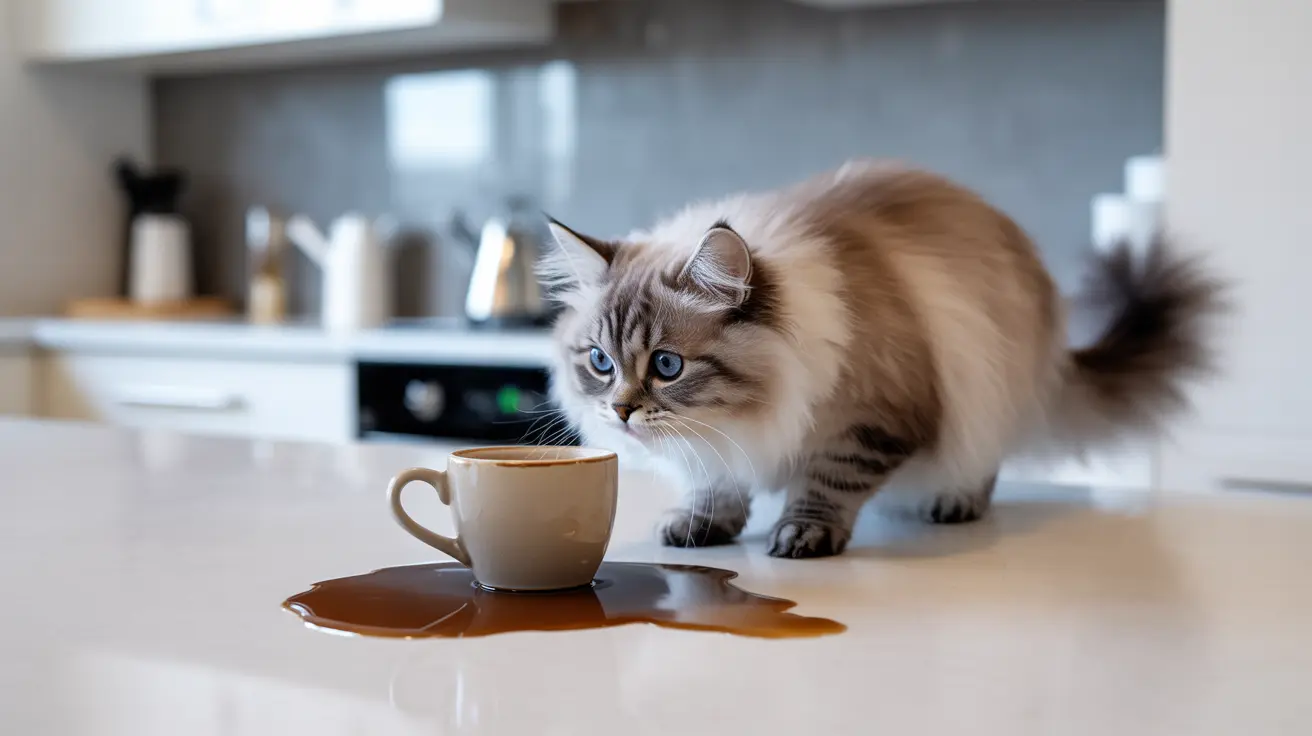Coffee might be your morning essential, but for cats, it can be a deadly poison. As a pet owner, understanding the severe risks of caffeine toxicity in cats is crucial for keeping your feline friend safe. Even small amounts of coffee or caffeinated products can trigger serious health emergencies in cats, whose bodies are far more sensitive to caffeine than humans.
In this comprehensive guide, we'll explore why coffee is dangerous for cats, what symptoms to watch for, and what to do in case of accidental ingestion. We'll also cover prevention strategies to protect your cat from this common household hazard.
Understanding Caffeine's Toxic Effects on Cats
Cats process caffeine very differently from humans due to their unique metabolism. As members of the methylxanthine family of chemicals, caffeine acts as a powerful stimulant affecting multiple body systems in cats. Their smaller size and inability to efficiently break down caffeine make them especially vulnerable to its toxic effects.
Even a few laps of coffee or exposure to coffee grounds can lead to dangerous symptoms, as cats are significantly more sensitive to caffeine than humans or even dogs. The toxic dose can be reached quickly, particularly in smaller or younger cats.
Common Sources of Caffeine Danger
While coffee is the most obvious source, cats can be exposed to dangerous levels of caffeine through various products:
- Coffee beans, grounds, and brewed coffee
- Tea (both black and green varieties)
- Energy drinks and sodas
- Chocolate and cocoa products
- Caffeine pills and supplements
- Some medications and diet pills
Warning Signs of Caffeine Poisoning
Recognizing the symptoms of caffeine toxicity can help you act quickly if your cat is exposed. Early signs typically appear within 1-2 hours of ingestion and may include:
- Restlessness and hyperactivity
- Vomiting and diarrhea
- Elevated heart rate
- Rapid breathing
- Muscle tremors
- Excessive thirst and urination
- Elevated body temperature
Emergency Response and Treatment
If you suspect your cat has ingested coffee or any caffeinated product, immediate veterinary care is essential. Do not wait for symptoms to appear or worsen, as early intervention significantly improves outcomes. Your veterinarian may implement various treatments, including:
- Induced vomiting (if caught early)
- Activated charcoal administration
- IV fluid therapy
- Medication for symptom management
- Cardiac monitoring
- Supportive care
Prevention: Keeping Your Cat Safe
The best approach to caffeine toxicity is prevention. Implement these safety measures in your home:
- Store all coffee products in sealed containers
- Clean up spills immediately
- Never leave coffee cups unattended
- Keep energy drinks and sodas out of reach
- Secure medication cabinets
- Inform guests about the risks of leaving drinks unattended
Frequently Asked Questions
Is coffee toxic to cats, and what are the risks if they ingest it?
Yes, coffee is highly toxic to cats. The caffeine in coffee can cause severe symptoms including rapid heart rate, hyperactivity, tremors, and in serious cases, seizures or death. Even small amounts can be dangerous due to cats' small size and sensitivity to caffeine.
What are the symptoms of caffeine poisoning in cats, and how quickly do they appear?
Symptoms typically appear within 1-2 hours of ingestion and include restlessness, vomiting, rapid breathing, elevated heart rate, and tremors. In severe cases, symptoms can progress to seizures and collapse. These effects can last 12-36 hours or longer.
How can I prevent my cat from accessing caffeinated products like coffee and energy drinks?
Store all caffeinated products in sealed containers out of reach, clean up spills immediately, never leave drinks unattended, and keep energy drinks and medications securely stored. Educate family members and guests about these safety measures.
What should I do immediately if my cat ingests caffeine, and when should I seek veterinary help?
Seek immediate veterinary care if you suspect your cat has ingested any amount of caffeine. Don't wait for symptoms to appear, as early treatment is crucial. If possible, bring the product packaging to help determine the amount ingested.
Can cats recover from caffeine poisoning, and are there any long-term effects if they receive prompt medical care?
With prompt veterinary treatment, many cats can recover from caffeine poisoning. However, severe cases may result in long-term organ damage. The prognosis is best when treatment is initiated quickly after exposure.
Remember, when it comes to cats and caffeine, there is no safe amount. Keep all coffee and caffeinated products safely away from your feline companion, and act quickly if exposure occurs. Your cat's life may depend on it.






